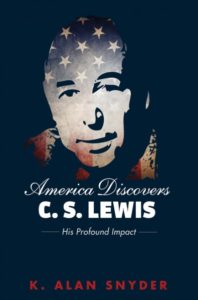Yesterday was the final class for my C. S. Lewis course at SEU. This is the third time I’ve taught the course, and probably the best, as I’ve grown more comfortable sharing what I’ve learned about Lewis and his writings.
The students read a lot of Lewis, from autobiography to apologetics to fantasy. Some have testified that taking the course at this time was a great help to their faith, as they were struggling in different ways. That kind of testimony is what I love to hear the most. If a course doesn’t aid in solidifying one’s faith, what is the reason for even offering it?
 In the last few weeks, I’ve had them read my own book on Lewis that focuses on his relationship with Americans and his impact on this country. I summarized both the book and the course with the following words:
In the last few weeks, I’ve had them read my own book on Lewis that focuses on his relationship with Americans and his impact on this country. I summarized both the book and the course with the following words:
Lewis has developed a true fan following in America. This book has shown his many interactions with Americans of his day. He became good friends with many of them, whether in person or via mail. His correspondence is overflowing with responses to Americans on the full panoply of issues, and he was quite willing to share the progress of his personal life and faith with them as well.
He married an American. The man he thought would serve best as his personal secretary was an American. Thousands of Americans he never communicated with or met, both during his lifetime and after, have testified to their lives being changed by his words. Societies bearing his name have cropped up all over the United States. One institute has developed a discipleship program inspired by him. An American foundation named after him bought his home in Oxford and uses it as a study center. That same foundation is now working to establish a college named after him.
While it is impossible to quantify his impact on America and Americans, the documentary evidence is plentiful that American Christians look to him in a way that is unique among all the Christian writers and teachers, both past and present, available to them as mentors.
In one of Lewis’s essays, “Is Theology Poetry?” we see a shining example of all the features of his writing that appeal, not only to Americans, but to all who thrill at hearing words of truth communicated elegantly. In this essay, he says,
The Pagan stories are all about somebody dying and rising, either every year, or else nobody knows where and nobody knows when. The Christian story is about a historical personage, whose execution can be dated pretty accurately, under a named Roman magistrate, and with whom the society that He founded is in a continuous relation down to the present day. It is not the difference between falsehood and truth. It is the difference between a real event on the one hand and dim dreams or premonitions of that same event on the other.
That essay then concludes with the words that can be found on Lewis’s commemorative stone in Westminster Abbey’s Poets Corner: “I believe in Christianity as I believe that the Sun has risen, not only because I see it, but because by it I see everything else.”
Through C. S. Lewis, a multitude of Americans have learned to believe in Christianity because they have seen it come to life in his writings, and by those writings he has shown them how to see everything through the lens of the Christian faith. That is his legacy. That is what a man who never saw America has given to Americans—an illumined Christianity that lights up all of life.
